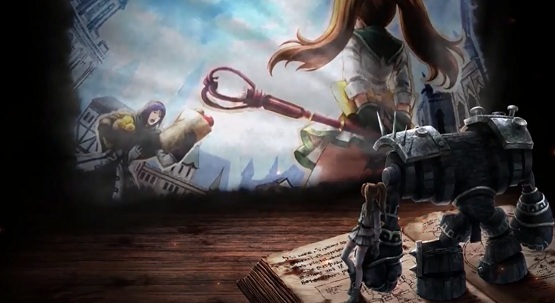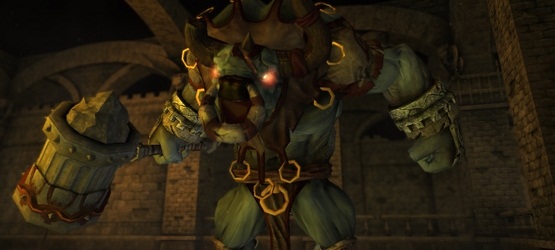
Playing through Natural Doctrine is like digging up a precious dinosaur skeleton. There’s something awesome underneath the surface, you just have to slowly, carefully, slowly, arduously, slowly unearth it very slowly, without going too fast. Yeah.
Similarly, discovering the good about Natural Doctrine didn’t happen overnight; it happened over many nights, some more rewarding than others. There’s a quality tactical RPG within this package, you’ve just gotta work to unearth it.
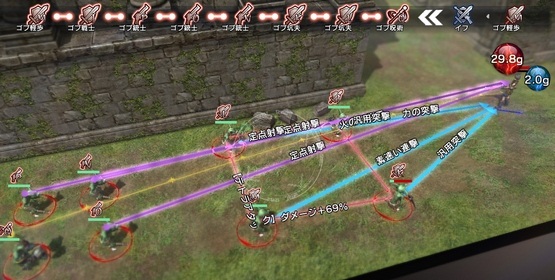
An opening tutorial shows players the basics of moving, attacking, and defending, but after that, you’re left on your own to figure things out. While this, on paper, sounds great (and many games have used are served well by such practices), it opens the game in a rather confusing way, even to genre veterans. There are so many interface and battle differences between this game and its genre companions (such as Disgaea, Fire Emblem, Tactics Ogre) that nearly every player will find himself/herself confused often, until things finally click through a long, long series of trial and error.
Crucial game systems are not explained, which, in a tactical RPG, is odd and something of a disservice. In lieu of time-saving tutorials, you’ll simply be made to enter half-hour or hour-long battles only to die and hopefully learn a key lesson in the process. If explanations were present but simply optional or buried within a menu, that’d be one thing, but it’s a whole other problem to have the game not at all tell you why the enemies suddenly got to do what they did. Platformers and shooters generally don’t need as much explanation as a tactical RPG, and yet even the common game these days will explain more to the player. I speak so long on this topic because the lack of info in Natural Doctrine can and will piss a lot of people off.
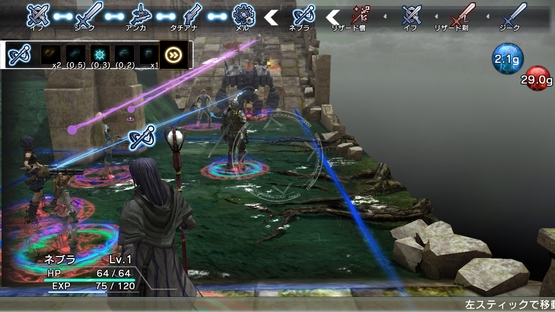
Fortunately, there’s light at the end of the tunnel. After seeing the Game Over screen a few times, you’ll begin to pick up on ways to take advantage of the game’s turn system, among other little battle tactics. The problem is that this takes hours compared to the minutes a more detailed tutorial would have taken. From there, Natural Doctrine‘s brightest aspects can shine. Each battle provides a lengthy task that will challenge the player’s ability to use what they know and treat every single action with care. Natural Doctrine is punishing — great news in these days of easy games — but there is usually a way to look closely at the situation and puzzle out a way to victory.
The operative word there is “usually.” Once in a while, dickish level design or bugs get in the way. For example, there are enemies that will wipe out the entire party with one or two attacks; no problem if you can stick and move or avoid these enemies altogether right? Wrong. In some cases, you’ll spend half an hour carefully setting up your party to either attack or escape, but a cinema will undo all your hard work, placing every character right in the kill house. Awesome. Some of the longest battles have check points, but most of the time, death means you can either start the whole battle over or turn the console off. Either way, your progress is tossed aside because a cinema undid your strategy with no warning.
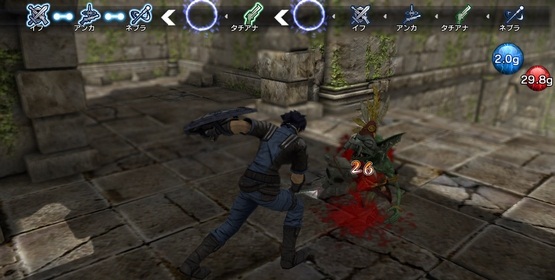
There are fun battles in which the player can evaluate the situation and approach it one of several different ways, but then there are the times when only one strategy will win the fight. Natural Doctrine has whole stages designed to kill you if you don’t use exactly the strategy the designers want you to use, which to the age-old discussion of good difficulty versus bad difficulty. Is a game “hard” because it is, quite simply, setting a very difficult task — in which one will probably die — before the player, which can eventually be overcome by familiarity and skill (see: Demon’s Souls). Or is a game “hard” because it sets the player into a situation in which a Game Over will definitely happen, no matter what he/she actually does beforehand, and must use that experience and lost time as a teacher (see: Natural Doctrine). Dying is one thing, but dying because the developer decided that you die here is another. For this reason, players celebrate their copious deaths in some games, but not others. Natural Doctrine has the kind of artificial difficulty that will get more jeers than cheers.
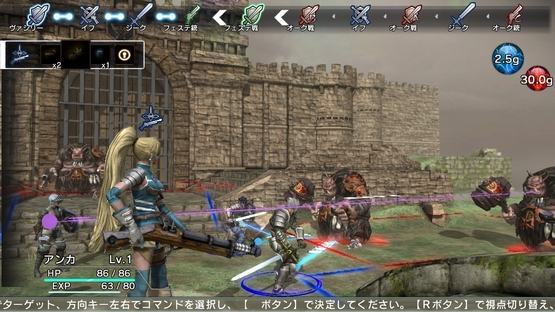
And yet we come around again to how satisfying it can be to pull of a huge combo and kill everything in the face. Near the end of the game, if you play it right, you can string together over 20 actions before the enemy gets a turn, mowing down a shload of mobs in the process, and all thanks to your brilliant planning and hard work. Feels good man.
There are, however, barriers created by the lack of polish. Enemy animations and turns waste way too much time. When pick-wielding goblins miss, you’ll be made to sit through the animation of that goblin yanking once, twice, three times to pull his weapon out of the ground. Again and again. Yankin’ that pick. You’ll watch dragons shake their heads and roar over and over again in between your strikes. It goes so slow and happens so much that it become grating.
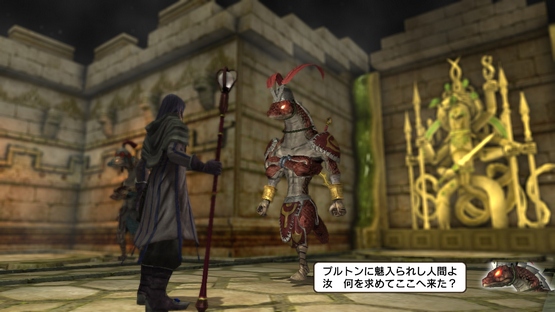
Often, instead of playing the game and attacking the player or setting something up, the enemies will pull a Stella Deus; which is to say, they move around in the same faraway locations, refusing to come within range of the player, thereby guaranteeing a first strike. You see this in Heroclix games with particularly stubborn, jerkish opponents. They’ll sit there and smile while they just clear and keep Batman in hindering terrain and move people behind walls; you can’t do the same thing, because the game will never end. Now consider that a computer has infinite patience and the poor level design of Natural Doctrine, and you get a recipe for ambush, minus the surprise. In a game where a single character getting knocked out means Game Over, that can be a little frustrating.
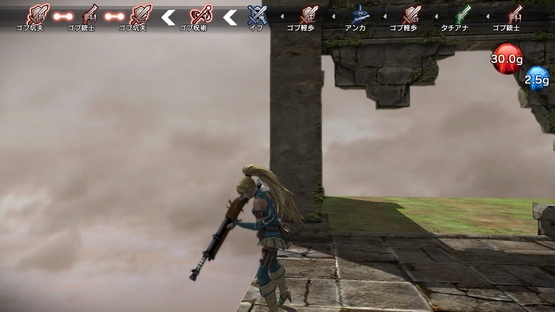
The battles do step up the fun in the mid to late game, when certain character practically bring new strategy possibilities with them. They really open up the combat and add layers of strategy to some situations. Occasionally, they can seem a little bit like a tent pole, but this seems to happen in most tactical RPGs.
Outside of battle, characters improve via their skill trees. These are simple to understand, very nicely laid out and give the player something to look forward to. If you should regret a decision or find a tough battle in which a different approach would be better, you can go into the menu and undo a lot of your skill point spending. Think you’d rather have an agility boost than a defense upgrade, then undo one and grab the other with the points you freed up. Nice.
Don’t bank on a memorable story from Natural Doctrine. To its credit, developer Kadokawa does throw some unexpected twists into the plot here and there (importers will know of one huge one, holy crap), but for the most part, it’s a typical game story simply written because there was a gameplay system that needed a story jammed into it. Cheesy direction (t-t-t-triple replaaay!) detracts from the experience.
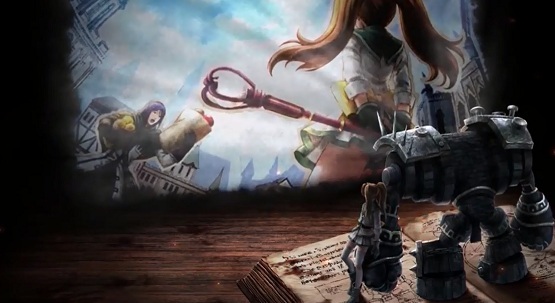
The characters end the game as paper-thin as they began; you won’t hear anyone talking about Natural Doctrine‘s cast in years to come. They’re not horrible, but they’re not good either. Nonetheless, as a fan of finality, I do love the little epilogues that focus on each character.
The graphics and music are fine. It’s definitely not pushing the limits of PS4 hardware, and in fact there doesn’t appear to be a big difference between the PS4 and PS3 versions of the game, but it looks good enough. Tactical RPGs generally don’t lead the way in visuals, anyway. The music gets the job done as well. Nothing remarkable, but good enough.
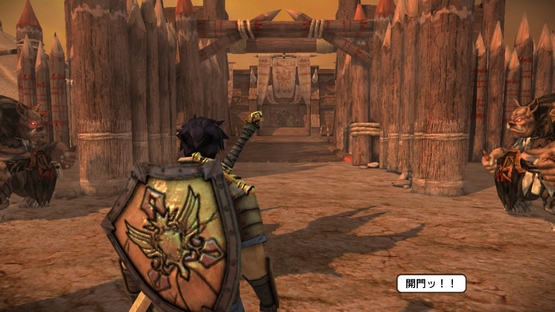
If you’re wanting to fire up Natural Doctrine and play a single battle, set aside a good amount of time, because 20 minutes would be considered a speed run in most fights. Other times, you could easily be looking at a 45-minute commitment for one battle. If you sit down for a game night with Natural Doctrine, you could end up, at the end of two hours, having little or no progress to show for your time. How awesome that is depends on you.
One should usually avoid predictions in reviews, but I’ll make an exception for Natural Doctrine. I expect this to be a very polarizing game. There will be a lot of fiery complaints about the fact that many new stages are set up with some kind of trap in place that will instantly deliver death without giving the player time to react. Meanwhile, it might very well be submitted to “Sleeper Hit of the Year” lists. Some will praise it up and down for its new battle system and frequent Game Overs, others will want to throw it in the ocean due to the slowness of said battle system, lack of explanations, and aforementioned frequent Game Overs.
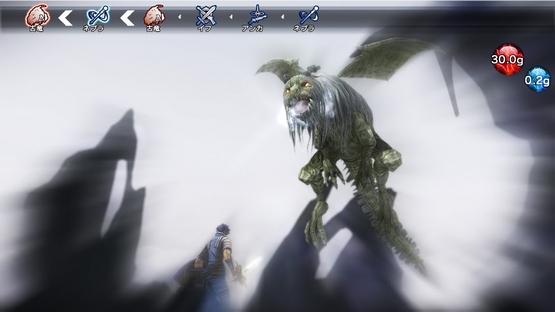
Natural Doctrine has a lot of good and a lot of bad clashing head-on. Overall, I’m glad I spent my time with it, but find myself wishing so hard that the user interface and level design were given more attention. The mechanics are interesting and make for some intense battles, but the pace seems much slower than it needed to be. Furthermore, some will take issue with the idea that a long slog through such a slow-moving system can result in no progress, due to unforeseeable circumstances or devious stage design. At the end of it all, a completionist’s game clock will might be in triple digits, but actual progress time much different because of the time spent getting stomped. In all of the best and worst ways, prepare to die.
Review copy provided by Play-Asia.com. PS4 version reviewed; also available for PS3 and PS Vita. You can import your copy here. The PS4, PS3, and PS Vita systems are all region free and can play game software from anywhere in the world.
(Post-review notes for importers. Read the PSLS guide to importing here. Reviewer lives in Japan and is proficient in Japanese, but often gives advice to importers of all levels.)
All dialogue and menus use full-on adult Japanese without furigana, so your kanji level should be good to really understand the skill tree and fine details of the story. The tutorials don’t even exist for a lot of crucial game mechanics, so if you already imported this and and are having trouble, rest assured that language barrier is only a portion of your struggles 😉
The good thing about cheesy characters is overacting. If you don’t speak a language, overacting can be a wonderful help to you. In that way, you might be able to get the gist of the story without having to read much.
As always, you can email me (heath at playstationlifestyle dot net) or drop a question in our forums if you have a question.
-
Interesting battle system
-
Very difficult...
-
...requiring deep strategy
-
Basic yet functional skill trees
-
Character-centric epilogue set
-
Battles move so slowly...
-
...even easyish battles take forever.
-
For a game with so many new mechanics, an odd lack of explanations.
-
Terrible UI; nothing is intuitive.
-
Lacks polish
-
No mid-battle save in these long fights
-
Awful level design
-
Hurry the hell up!
